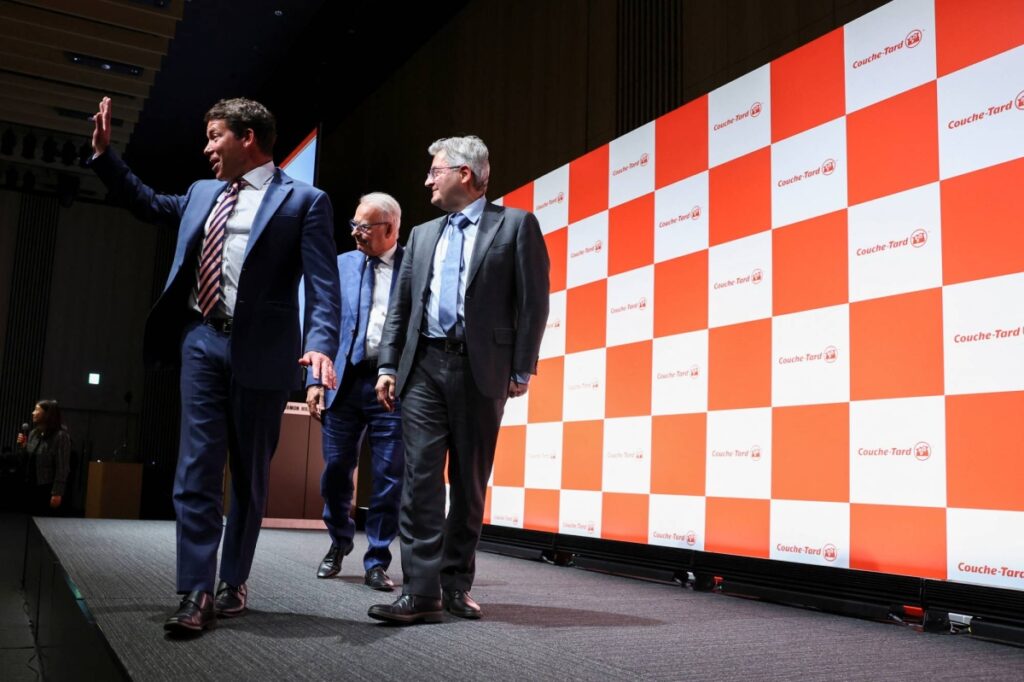Alimentation Couche-Tard’s lengthy battle to acquire Seven & I has no end in sight, with the Canadian company ramping up its campaign in a bid to position itself as the likely acquirer — but to no avail.
Executives at Couche-Tard came to Tokyo last week, holding a news conference in an attempt to better explain their side of the story.
But Seven & I has been giving the cold shoulder from the start, when Couche-Tard launched its bid last August, saying it has a better plan in the works.
The buyout bid has triggered a mixed response in Japan, with some expressing concerns over the convenience store chain — a key piece of infrastructure in Japan — going into the hands of a foreign company, with others worried about how it might impact in-store food quality.
The following are questions and answers on Seven & I’s buyout deal.
Why does Couche-Tard want Seven & I?
Couche-Tard, which owns the Circle K brand operating 16,800 stores globally, is on a growth push, and has been snapping up complementary acquisitions.
But Japanese convenience stores — ubiquitous, compact spaces where customers can pay household bills, send packages and buy everything from condiments and makeup to fresh coffee and fried chicken — are a more complex target.
Acquiring Seven & I, the operator of the largest convenience store chain in Japan, would exponentially catapult the group’s business reach. In addition to about 22,800 outlets in Japan, 7-Eleven has an established presence overseas, boasting around 85,800 stores globally.
Couche-Tard executives have been effusive about Seven & I, citing its strong brand as part of the attraction.
The weakness of the yen has also fed into the matter of timing — Seven & I rejected an initial buyout bid worth around ¥6 trillion ($40.6 billion) from Couche-Tard, which it argued “grossly undervalues” the company. Couche-Tard responded by increasing its offer to ¥7 trillion.
While much attention has been on what would happen to the Japanese convenience store business, analysts suggest that in fact, the U.S. market is what Couche-Tard’s acquisition efforts are really focused on.
Why isn’t Seven & I keen on the deal?
Seven & I hasn’t said outright why it doesn’t like Couche-Tard’s buyout deal, focusing more on the possibility that the deal would go against U.S regulatory hurdles.
Couche-Tard argued its “successful track record” working with regulators should alleviate Seven & I’s concerns.
But in an interview with the Yomiuri Shimbun over the weekend, Stephen Dacus, Seven & I’s newly appointed CEO, reiterated the company’s concerns. “They just kept saying, trust us. We can do this,” he said, adding that no clear solutions had been provided.
There are also worries over whether Couche-Tard would slash the number of Japanese employees and close down unprofitable stores — a concern shared by Dacus.
“We have no interest and no plans to close doors, fire employees,” Alex Miller, Couche-Tard president and CEO, said at the news conference last Thursday. “That’s not what we do. We invest in growth. This is not about us cutting jobs.”
Couche-Tard executives were also specifically asked by reporters about extending expiry dates on onigiri that may risk lowering the quality of in-store products. Couche-Tard emphasized such matters would remain under the oversight of local teams in Japan.
Seven & I’s actions speak louder than words.
Earlier this year, a $58 billion joint management buyout bid that would have allowed Seven & I to go private fell apart. This came after after trading house Itochu backed out of a ¥1 trillion investment it was considering making.
Since then, Seven & I has unveiled a massive buyback scheme, which it plans to finance by taking its U.S. convenience store subsidiary public and selling off non-convenience store assets to Bain Capital.
Seven & I is not the only party skeptical of the deal.
Economic revitalization minister Ryosei Akazawa expressed concern in January about foreign ownership negatively impacting Seven & I’s deal with local governments in times of disaster.
Seven & I is classified as being “core” to national security in Japan, with some of the convenience store chain’s outlets being designated as “disaster support stations,” providing information, water and restroom facilities in the face of large-scale disasters.
“If Seven & I’s convenience store business is in foreign hands and run solely for profits, we’ll have to think about … whether we can get full support when our people affected by the disaster are suffering,” he said.
Couche-Tard has said that it will honor these commitments.
What’s next?
Currently, Seven & I’s option is to either get the market on board in its strategy to go on its own, or accept Couche-Tard’s buyout deal amid pressure from shareholders.
Japanese companies are required to take buyout offers seriously amid a corporate governance push, leaving them with little wiggle room if the deal is good for shareholders.
And some shareholders, including U.S.-based Artisan Partners, want Seven & I — which has a history of underperforming — to “fully and meaningfully engage” with Couche-Tard in the deal.
As Seven & I hurtles toward a much anticipated shareholders’ meeting in May, there are likely to be more twists and turns in the days to come.





